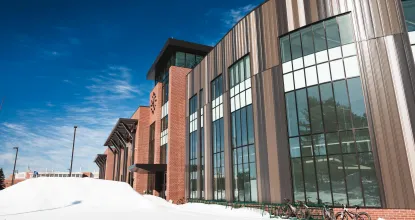Applicability:
Northern Michigan University students, faculty, and staff.
Purpose:
The intent of this policy is to make clear certain uses which are and are not appropriate, not to exhaustively enumerate all such possible uses. This statement represents a guide to the acceptable use of network and computing resources. Using these guidelines, Northern Michigan University may at any time make determinations that particular uses are and are not appropriate.
Policy:
Central to appropriate and responsible use is the stipulation that network and computing resources shall be used in a manner consistent with the instructional, public service, research, and administrative objectives of the University
What is a User at Northern Michigan University?
A "User" is any individual who uses, logs in, attempts to use, or attempts to log in to a NMU system, whether by direct connection or across one or more networks, or who attempts to connect to or traverse a network, whether via hardware, software, or both.
Privacy
Users must respect the privacy of others. NMU users who invade the privacy of others may have their access suspended and may also be subject to university disciplinary action. NMU will make reasonable efforts to maintain the confidentiality of files stored on university hardware and to safeguard the contents from loss, but is not liable for the inadvertent or unavoidable loss or disclosure of the contents, or for disclosure resulting from the unlawful acts of others. NMU has the right of access to investigate complaints and manage the network and computing resources of the University, and to keep records and files to the extent appropriate to administer those computing resources.
For your own personal protection and the protection of the University computing system, users are expected not to share their user ID and password with any other persons.
Users may not assume another person’s identity or role through deception or without proper authorization. You may not communicate or act under the guise, name, identification, email address, signature, or indicia of another person without proper authorization, nor may you communicate under the rubric of an organization, entity, or unit that you do not have the authority to represent. Users shall not intentionally seek information on, obtain copies of, or modify files, other data, or passwords belonging to other Users, whether on the NMU campus or elsewhere, or develop or retain programs for that purpose.
System Integrity
Users must respect the integrity of NMU’s computing and network systems on campus and at all sites reachable by NMU’s external network connections. Computing services and wiring may not be modified or extended beyond the area of intended use. This applies to all network wiring, hardware, and in-room jacks. The NMU network may not be used to provide unauthorized Internet access to anyone outside of the university for any purpose. Users shall not intentionally develop or use programs that harass other users, that obstruct or disrupt use, or that attempt to damage, alter, or infiltrate (e.g. gain access without proper authorization) a computer, system, or network.
To respect the shared nature of resources you shall avoid activities that unreasonably tax system resources or that, through frivolous use, goes beyond the intended use of the system. This includes sending “chain letters,” “spam,” or “broadcast” messages to lists or individuals, and other types of use which would cause network congestion or otherwise interfere with the work of others.
Laws: United States Copyright Law
Copyright is a form of protection provided by the laws of the United States (Title 17, U.S. Code) to the authors of “original works of authorship,” including text and content, images, computer software, motion pictures, and music. Unauthorized copying or downloading of copyrighted material is in violation of U.S. copyright laws. You may not copy or redistribute copyrighted software, music, or other information and you may not attempt to override copy protection on commercial software. For more information on copyright and fair use provisions, go to the NMU Olson Library web site (http://www.nmu.edu/olsonlibrary).
The Law of the State of Michigan
Act 53 of the Public Acts of 1979 of the State of Michigan is “An act to prohibit access to computers, computer systems, and computer networks for certain fraudulent purposes; to prohibit intentional and unauthorized access, alteration, damage, and destruction of computers, computer systems, computer networks, computer software programs, and data; and to prescribe penalties.”
The penalties for violating this act follow: A person, who violates this act, if the violation involves $100.00 or less, is guilty of a misdemeanor. If the violation involves more than $100.00, the person is guilty of a felony, punishable by imprisonment for not more than ten (10) years, or a fine of not more than $5,000.00, or both.
Student Code
Student behavior on and off campus is governed under the Student Code. All regulations related to communication and use of University resources also relate to Internet usage. Some examples include but are not limited to Harassment, (2.2.17 which can be accessed at dso.nmu.edu/handbook/code2217.html), or Unauthorized access to Information (2.2.27 accessed at dso.nmu.edu/handbook/code2227.html). Other University Student Code Regulations and Policies are listed in the NMU Handbook and can be accessed at dso.nmu.edu/handbook. All of the policies and regulations which are listed there also cover the use of computers and the Internet.
Disciplinary Actions Taken
When NMU has reasonable cause to believe there has been inappropriate use, NMU staff will take immediate remedial action. In an emergency, in order to prevent further inappropriate activity, NMU computing staff may temporarily disconnect a user from the Network. Punishment for violation of the NMU Acceptable Use Policy may include, but is not limited to, temporary or permanent disconnection from NMU Network Resources, suspension of a specific user's NMU ID for up to one(1) academic semester, or further disciplinary action deemed necessary by the Dean of Students Office or where appropriate, the Human Resources Office, Office of the Provost and Vice-President for Academic Affairs, or law enforcement agencies.
